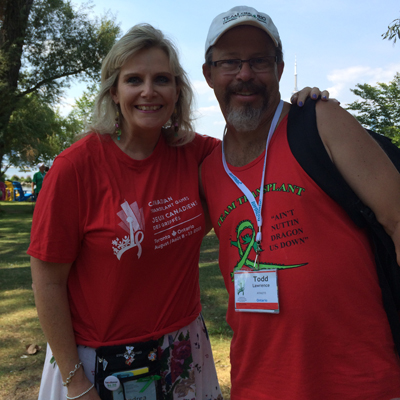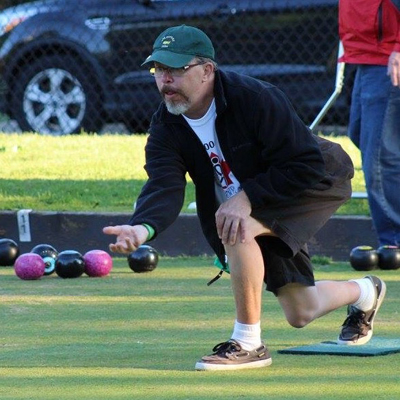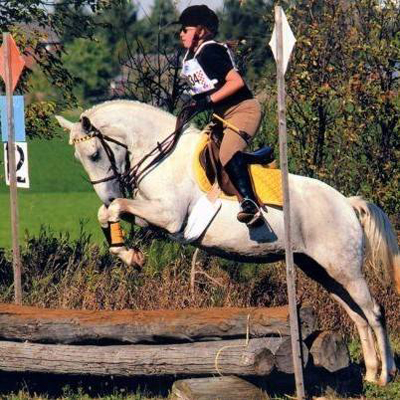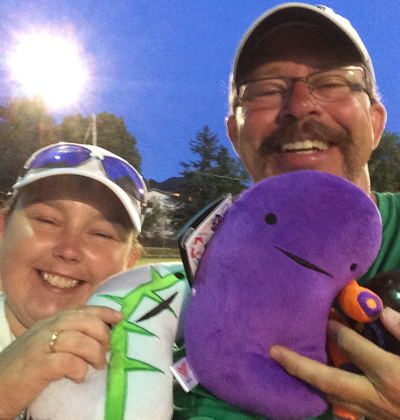
Andrea Norgate, Pancreas Transplant Coordinator at TGH, and Todd Lawrence, who received a kidney and pancreas transplant at TGH, pose for a photo during the Canadian Transplant Games. Andrea also worked as Medical Lead for the week of the Games in Toronto. (Photo: Todd Lawrence)
Organ recipient Todd Lawrence lives by a simple but poignant catchphrase: "For my donor."
At this year's Canadian Transplant Games, hosted in Toronto earlier this month, Todd's catchphrase caught on amongst his peers.
To register your consent to be an organ and tissue donor, please visit
www.beadonor.ca
"Any activity where I was doing well – if I was golfing, and I hit a good shot, I would say 'For my donor!' – That sends out a message that it's not about me, it's about my donor. That's why I'm here," he says.
"It got to a point at the Games where everyone joined me and we would all yell it out together."
Since 2000, the Canadian Transplant Games have been bringing together organ recipients, organ donors and organ donors' families for a fierce competition and a fond celebration of a second chance at life.
These Games brought together about 185 participants from across Canada, and 35 per cent of the athletes had received their transplants at Toronto General Hospital (TGH).
This year, for the first time, living organ donors competed alongside recipients.
"There's a strong bond between all of us participating," Todd says. "We all have our own story but we understand each other."
Related to this story
Todd's story: A journey of gratitude
Diagnosed with Type 1 diabetes at age 11, Todd lived with the disease for more than 20 years when his kidneys began to fail. After a three-year period on dialysis, he received a long-awaited call in 2002 from TGH. A deceased donor was a match for the kidney-pancreas transplant Todd needed.

At this year's Games, Todd competed in lawn bowling (singles and triples), golf, 10-pin bowling and shot-put. (Photo: Todd Lawrence)
"There was so much excitement, but at the same time I was thinking about my donor's family and what they must have been going through at that moment."
Now, 14 years after his transplant, Todd sees the Transplant Games as an opportunity to give back.
"For me, one of the most emotional moments is during the opening ceremonies when the donor families march in," he says. "They're looking right at the recipients and they see how much we appreciate them, what they've gone through and what they are going through."
At this year's Games, Todd competed in five events and received a medal for each. One fellow Toronto General organ transplant recipient and friend beat him out of a gold medal in lawn bowling: Jennifer Irwin, the Sport Co-Chair of the 2016 Canadian Transplant Games.
Jennifer's story: A return to sport
A low sugar episode set Jennifer Irwin on the track towards transplant.
In 2006, she received a kidney from her brother through the Living Kidney Donation program at TGH. Then, three years later, she received a pancreas donation from a deceased donor.

Thanks to her two transplants at Toronto General Hospital, Jennifer has been return to the sports she loves, such as horseback riding. (Photo: Jennifer Irwin)
Exercise for transplant patients
Athletic competitions such as the Transplant Games are just one way for transplant recipients to stay active post-transplant. Some might be surprised to learn that physical activity is key both for patients awaiting transplants and those who have received them.
"Exercise is important before transplant to be sure that patients are in the best physiological condition to undergo a transplant," says Dr. Heather Ross, Director of the Ted Rogers Centre of Excellence in Heart Function, PMCC and Medical Director of the Cardiac Transplant Program at TGH. "It can be quite difficult for patients to exercise when they have organ failure such as heart failure or respiratory failure. We use formalized exercise programs and rehabilitation to enable safe and effective exercise whilst patients wait."
Much like the cardiac program, the Toronto Lung Transplant Program at TGH integrates exercise throughout a patient's care. The transplant physiotherapy team works with each patient to develop a personalized fitness plan, says Denise Helm, Physiotherapist in the Toronto Lung Transplant Program.
Lung patients exercise with the team three times a week before transplant, and continue a routine with the program for three months after transplant – always closely monitored and well-educated about the activity.
"Exercise is essential for them even though they may find it a daunting idea," Denise says. "Patients are often surprised that they can exercise when they are at the stage of needing a transplant. Our programs are individualized in order to meet their changing abilities."
Once patients have received transplants, Dr. Ross recommends they speak with their medical teams for recommendations on how to stay active.
"We recommend 150 minutes a week of moderate exercise if deemed safe by the treating physician," she says. "PMCC routinely sends patients back for cardiac rehabilitation so they can be supervised as they resume their exercise program."
The same recommendation to stay active goes for other transplant recipients, such as those working with the lung transplant team.
"Our patients have worked so hard before and after their transplant to get in the best shape possible," Denise says. "I encourage them to continue this habit for life."
Before her diagnosis, Jennifer played softball and five-pin bowling, and rode horses. But her stint with disease forced her to take on a less vigorous routine.
"There was a long time I thought I wouldn't be able to lead the active and intense lifestyle I had," Jennifer says. "I used to run a farm but it got to a point where it was too much. I've been able to get it all back and even more."
For her, the Transplant Games represent how far all of the athletes have come.
"This is a way to show we can be athletic again; it's a platform for us to shine."
Organ donation works
According to the Trillium Gift of Life Network, there are over 1,500 patients waiting for an organ transplant and - of an eligible 12 million Ontarians - 29 per cent have registered consent to be donors.
"The purpose of the Games is to offer hope to the thousands of Canadians waiting for a life-saving transplant," explains Sandra Holdsworth of the Ontario Provincial Director of the Canadian Transplant Association, which organizes the Games. "Organ donation works – our lives have been extended.
"We need more people to register to be organ and tissue donors so more lives can be saved."
"It is really inspiring to physiotherapists and transplant patients to meet organ recipients who have participated in the Transplant Games or who are a number of years post-transplant. It is amazing to see the changes from pre to immediately post –transplant, and over the years as individuals are able to participate fully in life again." – Denise Helm, Physiotherapist at the Toronto Lung Transplant Program, TGH, who works with lung transplant recipient before and after transplant to build personalized exercise programs.
Much of Toronto's medical community also volunteered to help pull off a successful Transplant Games. Andrea Norgate, Pancreas Transplant Coordinator at TGH's Multi-Organ Transplant program, volunteered as the Medical Lead.
"The Canadian Transplant Games really represent joy and doing well," Andrea says. "When you're at the sporting events and the athletes cross the finish line, you don't even know who won because everyone is so happy."
A deep gratitude
Although needing a pancreas and a kidney forced Jennifer to put her life on hold for a few years, she's now grateful for her transplant experience.
"I've had a much more rewarding future than I thought I would have," she says. "I take on new challenges all the time. If I hadn't needed my transplants, I'm not sure I would be as ambitious as I am."

As kidney and pancreas recipients from TGH, Jennifer and Todd call themselves the K/P team and have the toy versions of a kidney and pancreas to match. (Photo: Jennifer Irwin)
Todd sees his life as a tribute to all the people who have helped give him a second chance.
"I want to leave people with this: when you look at me, you're not looking just at Todd," he says.
"You're also looking at my donor and their family. You're seeing what they've been through and a celebration of their loved one's life. When you look at me, you see my family too and how dedicated they are. You see all the hard work from the medical team at Toronto General Hospital and all the hours they put in to save me."
"And finally you see yourselves, because you can think about how you can help spread the message of organ donation."
The next
Canadian Transplant Games will take place in 2018 and the
Canadian Transplant Association has not yet announced the location. Next up for many of these athletes will the
World Transplant Games in Malaga, Spain in 2017.
